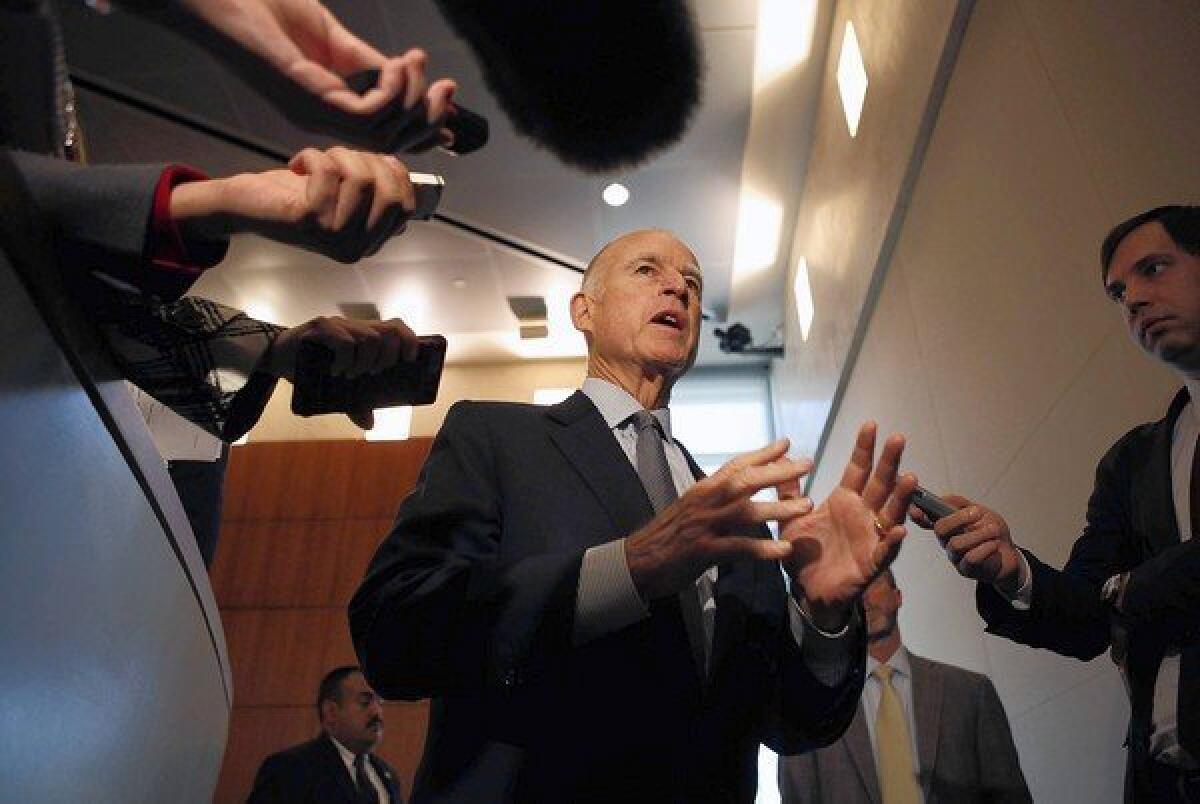Last-minute bill would exempt transit workers from new pension rules

- Share via
SACRAMENTO -- Thousands of employees of public transit agencies around the state would be exempt from stricter pension requirements under an eleventh-hour proposal expected to move through the Legislature next week with the blessing of Gov. Jerry Brown.
The compromise reached between the Brown administration and federal officials would allow local transit agencies to receive an estimated $4.3 billion in federal funds over the next year while ultimately letting the courts decide whether changes to state pension law can be forced on local transit workers, according to multiple sources familiar with the deal. Those sources spoke on condition of anonymity, not wanting to preempt the governor’s office, which is expected to announce the deal some time later on Wednesday.
U.S. Labor Secretary Thomas Perez wrote in a letter to Brown earlier this year that the state could miss out on the federal transit grants if it insisted on subjecting transportation workers to the same tighter pension rules that state lawmakers approved for most public employees last year.
While Brown is expected to sign the bill exempting transit workers from those rules through the end of 2014 -- including requirements for current workers to pay a larger share of their own retirement contributions, caps pensions for new employees and change the retirement age for most workers to collect a full pension from 55 to 67 -- the administration will back a lawsuit in federal court challenging a 1964 law that currently shields transit workers from having their pension benefits altered outside of the collective bargaining process.
The lawsuit challenging the law is expected to be filed in federal district court in Sacramento this week by the regional transit district, and backed by the governor. The deal, negotiated by officials from the Brown and Obama administrations, would allow the federal money to flow to the local transit agencies while the courts decide the future of the 50-year-old federal law.
Brown’s office declined to comment on the deal, but an announcement from the administration was expected later Wednesday.
Other parts of Brown’s pension plan are already being challenged in the courts. Cases in Marin, Alameda, Merced and Contra Costa counties are challenging the state’s right to impose anti-spiking provisions on current employees. The bill signed by Brown last year prohibits inclusion of unused vacation, sick or other types of “terminal leave” to increase an employee’s retirement payout.
Brown pushed the pension changes through the Legislature last summer, and was immediately met with objections from unions representing about 20,000 transit workers in California, which filed claims with the federal government contending that the new state law violated a federal law that requires any changes to transit workers’ retirement benefits to be made at the bargaining table and could not be unilaterally imposed.
In May, Brown sent a letter to then–acting U.S. Labor Secretary Seth Harris arguing that California’s pension changes comply with federal law and do not diminish transit workers’ bargaining rights. The typed, two-page letter included a handwritten note from Brown that said in part, “this is very important for the people of California, both for jobs and pension reform.”
The Obama administration sided with the unions. Last month, Perez sent Brown a response warning him that, “We are concerned that [the state law] diminishes both the substantive rights of transit employees under current collective bargaining agreements and narrows the future scope of collective bargaining over pensions.” Perez said he wanted “to urge California to act immediately to develop a solution to this issue.”
ALSO:
Brown signs bill to trim pension costsBrown risks backlash from pension proposal
Brown administration digs in against unions on pensions
More to Read
Sign up for Essential California
The most important California stories and recommendations in your inbox every morning.
You may occasionally receive promotional content from the Los Angeles Times.













